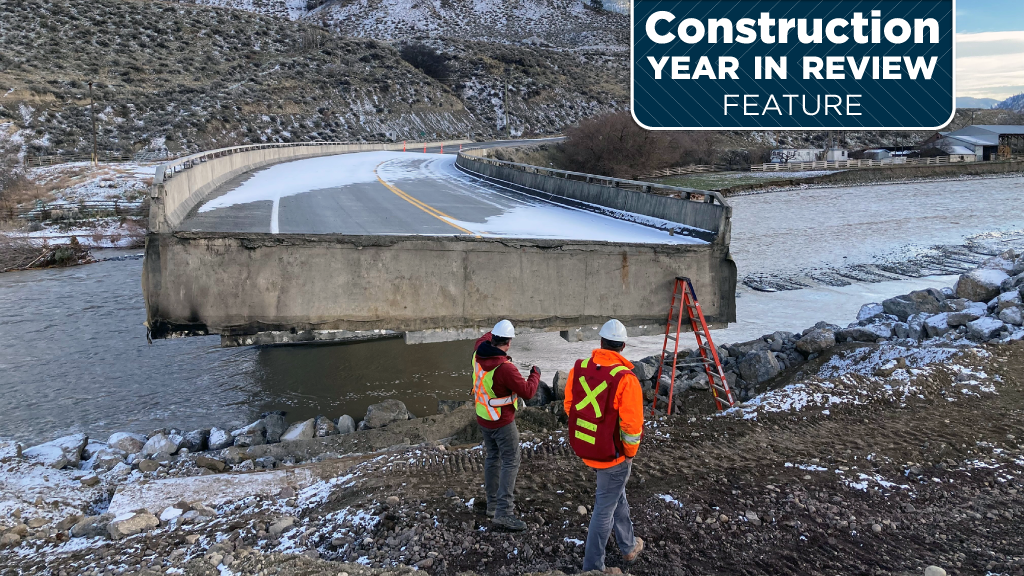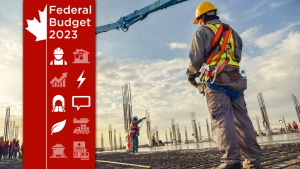COVID-19 continued to have a profound effect on Canadian construction national stakeholders suggested during year-end interviews, but their attention was drawn to other concerns such as the industry’s labour shortage, addressing climate change and how best to deliver infrastructure.
Asked what story or trend was most significant for their sector, most stakeholders canvassed acknowledged the deep disruptions the pandemic has caused, with both Mechanical Contractors Association of Canada COO Ken Lancastle and Progressive Contractors Association of Canada vice-president Darrel Reid pointing to pernicious supply chain problems associated with the pandemic. Meanwhile, Canada’s Building Trades Unions executive director Sean Strickland highlighted how workers persevered for a second year amidst the workplace challenges caused by COVID.
Strickland noted that workers remained essential during the second, third and four waves of COVID, adapting to new rules of split shifts and social distancing and wearing masks for eight or 10 hours a day as project teams struggled to regain former levels of productivity.
“That was absolutely the story of 2020 and latterly 2021 as well, and I’m really, really proud of how our industry responded and our members responded,” said Strickland.
“We were tracking cases among building trades members, and our percentage of cases was less than half the percentage of cases in the general population. So, we did a fantastic job of keeping the economy going to whatever extent we could, building infrastructure and making sure workers stay safe.”
Alberta-based Reid was interviewed in Toronto where he was attending a PCA conference, so complaints he heard about the supply chain were fresh.
“没有人真正知道COVID爆发时kind of impact it was going to have on the global supply chain, and our members struggled to find materials and have them delivered on time,” stated Reid, mentioning steel in particular. “That’s been a huge challenge to our members on the infrastructure file, they find project delays, they find challenges and workarounds that they have to do.
“It really cuts into productivity.”
Lancastle observed that the pandemic created a backlog of work that’s adding to the problem. Supply chain disruptions and associated price volatility are affecting contracts that were previously signed as well as those that are being tendered.
“That raises a lot of issues when it comes to contracts because that can impact how the project flows, scheduling, pricing,” he said.
An equally urgent problem, in Reid’s view, is the lack of skilled trades.
“Everybody’s talking about it now, all of our members,” he said. “They have really told us that as an association, we need to talk about urgent labour needs, address the government, how to get temporary foreign workers to meet that need.”
Lancastle说我有很多统一的声音n the sector addressing the issue with governments. The MCAC is raising “the specific types of trades within our sector, the important role they play within the overall economy, within the overall construction industry.”
Association of Consulting Engineering Companies-Canada CEO John Gamble referred to COVID’s “ongoing march,” with multiple effects on access to work sites, the supply chain and workforce availability, and its evolution which will continue to offer opportunities for learning lessons. For instance, he said, Zoom meetings are fine for “transactional” meetings but “less effective for blue-sky thinking, strategic planning, relationship building.
“Which leads us into what the new workplace will look like,” he said. The design sector will continue to wrestle with that in 2022, he said.
Both Gamble and Canadian Construction Association president Mary Van Buren cited the federal government’s commitment to a National Infrastructure Assessment (NIA) in Budget 2020 as highly significant this year — in fact it was the story of the year for both.

“This is an initiative that’s long overdue,” said Gamble. “It’s one of those things, if done well it can be extremely useful, extremely powerful and really move the yardsticks on ensuring that we’re investing strategically, we’re investing in the right things, we’re properly resourcing these investments and we’re getting good value for these investments.”
Van Buren noted the CCA has advocated for a 25-year infrastructure plan for years. If the NIA unfolds properly, she said, it will encourage CCA members to invest with confidence in innovation, technology and hiring apprentices.
“One of our key messages is that the federal government should fund programs, not individual projects,” said Van Buren. “They should work with a municipality or province and say, here’s the envelope of money, here’s what we expect from you for performance, and then you figure out where the needs are best suited to your community.”
The CCA executive also cited the immediacy of climate change as a developing story in 2021.
“Climate change is here,” she said, noting she had recently been in British Columbia to observe the impacts of flooding firsthand. “I heard there were something like 200 roads that were washed out. The B.C. road builders have done an amazing job in serving their communities.”
The construction industry will forge the “path to green,” said Van Buren. “We’re going to be the ones doing it.
“But to make that happen, certainly we need early contractor involvement so they can share best practices, what they can do to help reach those goals.”
Strickland also addressed project delivery, noting that CBTU lobbying paid off in 2021 as all three major parties pledged their support for workforce mobility tax legislation during the election campaign.
If and when legislation is passed, workers will be able to deduct expenses associated with moving to take up new work, said Strickland, “so more construction workers can go to where the work is.”








Recent Comments
comments for this post are closed